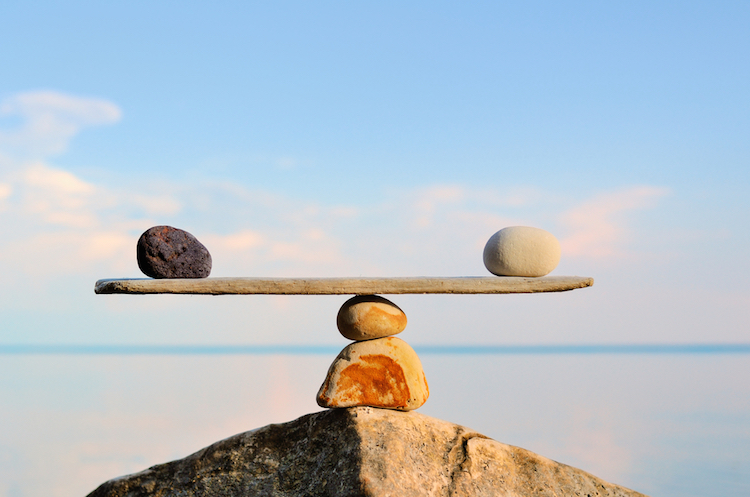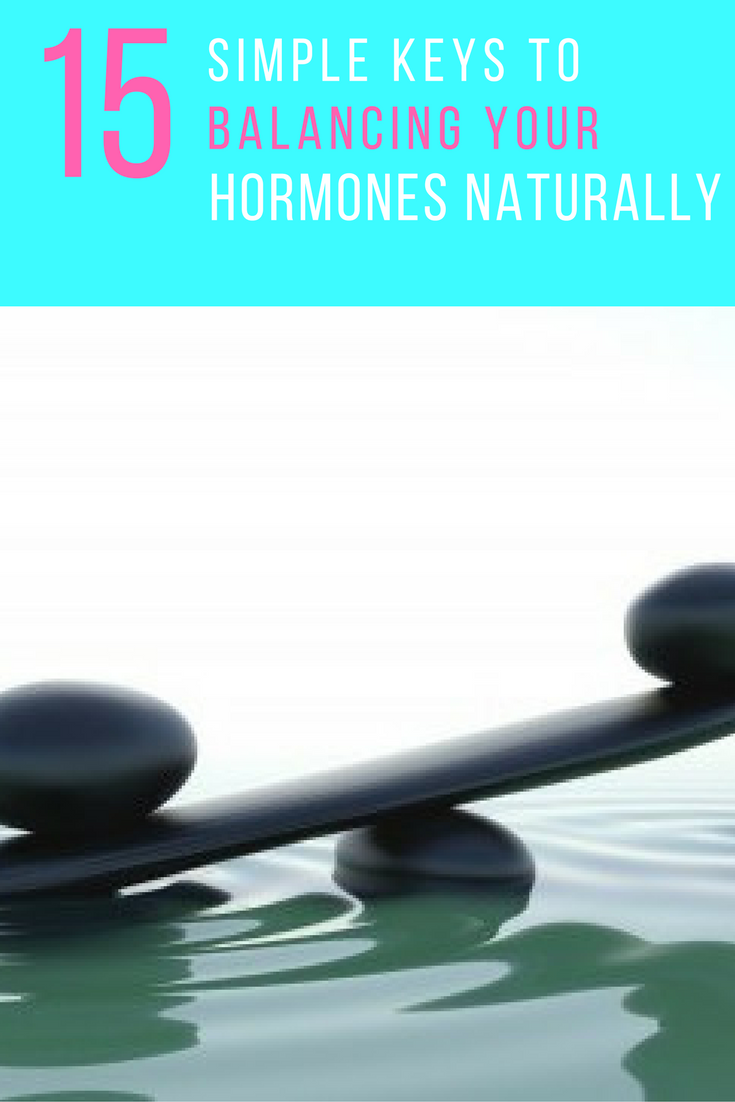
Any organization in the world, from the mail to the military, is only as good as the strength of its communication channels. Each entity must develop its own in-house communication system so critical information gets delivered intact and on time.
The same holds true for the human body. The messengers responsible for handling different types of growth, development and reproductive communications in your body are called “hormones.”
As PBS explains, each type of hormone has a different responsibility within the greater communications network.
What you might not realize, however, is that your choices can impact how and how well your body’s hormones do with delivering important messages in full and on time. In this article, learn about 15 easy tips to help your body balance hormones naturally.

Add healthy fats to your diet.
Yes, the word “fats” has a bad connotation for many health-focused people today. But in all the fuss, certain really good, beneficial fats have gotten unfairly lumped in with legitimately toxic fats, with the result that it often feels easier to just avoid fats altogether than to try and figure out which is which.
What to do: Choose healthy fats that are high in both Omega-3 and Omega-6 fatty acids, which your hormones require to do their jobs well. Coconut oil, fish oil, and olive oil are great choices.
Rest up!
If you are like many people, you know that rest and stress are inversely related. But did you know that rest and hormone balance have the same relationship?
In other words, the more rested you are, the more smoothly your body’s hormone-driven communication system will function.
What to do: Start preparing for sleep well in advance. Don’t eat after 7pm and begin to dim the lights nearer your bedtime. Keep regular sleep and waking hours. Most of all, try to get at least eight hours of sleep per night.
Keep your exercise in check.
If you’re not a workout fan, you are probably loving this tip. But this doesn’t mean you shouldn’t exercise at all. It just means you should avoid exercise that is so grueling or extended it could throw off your body’s hydration and hormones.
What to do: According to the New York Times, just 60 seconds of fully focused exercise can potentially deliver as much benefit as 45 minutes of mid-level exercise.
So the goal here is short bursts of intense exercise plus combining cardio and strengthening. This will give your hormones their best chance of balancing naturally.
Related: 10 Natural Ways to Increase Oxytocin Into Your Life
Clean up your digestion.
As each of us well knows, there is no shortage of delicious, easy-to-obtain foods today. But many of those foods that taste so pleasing to the palate suit you less well by the time they reach your digestive tract.
Poor digestion, gut issues, IBS (irritable bowel syndrome) and other issues can really mess with your hormone balance.
What to do: Focus on eating whole, unprocessed, natural foods with moderate levels of sodium and sugar. Drink plenty of pure water and chew slowly enough so that your gut doesn’t have to do all the work of digesting your food.
This will keep your immune system from getting sluggish and help your endocrine system (which issues and directs your hormones) stay healthy.
Supplement wisely with herbs.
So long as your doctor is on board with it, taking in certain herbs in supplemental form can be beneficial to keep your body’s hormone production and use running smoothly.
Just be sure to verify with your doctor that the herbs won’t interfere with any contraception, hormone replacement therapy, or other medications before you start taking them.
What to do: Chaste Tree (Vitex), evening primrose, and red raspberry leaf are all good hormone-balancing herbs for women in particular.
Related: 45 Surprising Uses For Essential Oils That Will Blow Your Mind
Steer clear of chemical interference.
Pick up any cleaning product in your cabinet right now, and you might find you struggle to pronounce some of the ingredient names. More people today are switching to natural cleaners to avoid the harsh, dangerous toxins and chemicals added to many commercially sold cleaning products.
These chemicals can interrupt your endocrine system function, interfere with hormone production and regulation, and cause serious health issues.
What to do: You can do anything any commercial cleaning product can do with a simple list of natural ingredients: baking soda, white vinegar, lemon juice, essential oils, salt, coffee grounds, water…. the list goes on and on. Switching to these safe cleaning products will give your hormones a chance to rebalance themselves.
Carefully monitor your liquid intake.
Here, the major area where many people err is in caffeine intake. Sometimes it can feel like the whole world runs on caffeine, which also explains why so many people discover they have endocrine system disruptions each year during their annual checkup.
What to do: The human body doesn’t require caffeine to function. It does require water balanced with electrolytes. If you take your weight and divide it by 2 then convert that number into ounces, this is the amount of water you should drink daily.
Get your daily dose of Vitamin D.
Our planet’s sun has gotten a very bad rap for the harmful ultraviolet rays it emits along with the warmth so necessary for our survival.
But for most people, 10 to 15 minutes of partial sun exposure daily can actually be a good thing. Vitamin D is so essential that without it, our whole physical system can start to shut down.
What to do: Try to get some sun each day to help your body produce the Vitamin D it needs to function well. If you can’t do that or your doctor will not permit it, then you can take a Vitamin D supplement instead.
Consume gelatin.
If you grew up with gelatin desserts, you might think of gelatin as this commercially processed mystery food that you now want to avoid.
But real gelatin is a powerhouse source of protein and collagen (the building block of healthy skin, hair, and nails) that every system in your body craves, the endocrine system being no exception.
What to do: You can find real, natural gelatin online or at local natural foods stores. You can add it to just about any dish, from meats and sauces to dessert, with the result being tastier eats and a healthier hormone system.
Be sure you are getting enough magnesium.
Magnesium is a trace mineral required by your body to synthesize serotonin, the “feel-good” hormone. It also is needed to make DNA and RNA.
When you don’t get enough magnesium, you might first notice it in your gut when your digestion feels “off” or you begin to feel mildly depressed.
What to do: Talk with your doctor about the right level of magnesium supplementation daily to keep your hormones and your health balanced.
Avoid dieting of any kind.
Despite the overabundance of research that suggests diets do much more harm than good, it is still very hard to resist believing that a diet can help you achieve your weight management goals.
What works so much better is to simply make small, daily nutritional changes that can lead to a long-term lifestyle change.
What to do: Any drastic dietary change, especially if coupled with a sudden calorie reduction, will upset your metabolic system. This will in turn disrupt your endocrine system and alter hormone production. This is why diets often feel so punitive and also don’t work 95 percent of the time.
Know and recognize the signs of a hormonal imbalance.
Many of the symptoms of hormone production disruption mimic the symptoms of other health issues. So if you don’t realize that your symptoms correlate with hormone imbalance, you might not have any idea how to fix it.
What to do: Remember that low libido, depression, fatigue (especially coupled with insomnia), gut issues, hair loss, anxiety, infertility and/or weight change are all known to stem from disruption of hormone production.
Take care with alcohol.
Alcohol in moderation, especially antioxidant-rich wines and nutrient-rich beer, can play a positive role in health. But if you are taking in more than the recommended daily dose for your gender and weight, you risk throwing your hormones out of balance as well as a host of other health problems.
What to do: Know your daily recommended alcohol consumption limit and always stay under that limit. This will protect your estrogen balance in particular.
Also be aware of when you may be consuming alcohol because of stress, peer pressure, fatigue, or other reasons, and try to substitute rest, relaxation, and other helps instead.
Steer clear of vegetable oil.
Vegetable oils are cheap to produce, so they make cheap processed food additives. But they don’t have the Omega-3 levels of their animal fat counterparts and can throw the body system out of balance with too much Omega-6 and not enough Omega-3. This can cause everything from infertility to breast cancer.
What to do: Whenever possible, substitute with coconut oil, avocado oil (one of the few vegetable oils that has both Omega-3 and Omega-6), and organic real butter for vegetable oils in recipes.
Reconsider using birth control pills.
There can be a time and place for the Pill in life. But long-term use has been shown to lead to elevated estrogen levels and a host of other unwelcome side effects.
What to do: Consider another form of contraception to give your hormones a break from artificial manipulation.
While it might seem like a big job to keep your hormones at optimal levels and in good working order at all times, it truly isn’t as difficult as it sounds.
Your body is already primed and ready to do whatever it takes to keep your hormones balanced and functional. All you need to do is to support it to do what comes naturally.
So don’t try to tackle all 15 of these tips all at once. Rather, choose one tip that stands out to you and feels particularly relevant to your health goals right now.
Start with that one tip and then add in others as the need may arise. In this way, you can help your body help you to feel fully vibrant and alive!